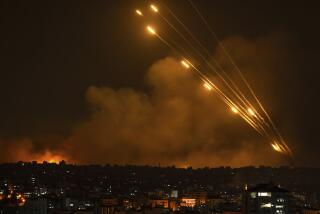Israel’s President Herzog Returns to Airwaves : Broadcasting: His radio reports during the 1967 war made him a hero. A recent address about current secular-religious strife caused a sensation.
JERUSALEM — Israeli President Chaim Herzog, whose radio reports during the 1967 Middle East War gripped his countrymen, has returned to his hobby of broadcasting to enliven his largely ceremonial duties.
On the last Thursday of each month Herzog sits at his desk in his official residence in Jerusalem and tapes an address to the nation, an Israeli version of the fireside chats popularized by President Franklin D. Roosevelt in the 1930s.
“I am completely at home with the microphone,” said Herzog, 71, a former British and Israeli military officer, U.N. ambassador, Labor Party legislator, lawyer and historian.
His radio reports in 1967 made him a civilian war hero in Israel’s six-day victory over Egypt, Syria and Jordan.
“I didn’t realize it at the time, but I had a listener rating of over 90%,” the Irish-born Herzog, president since 1983, said after taping an address last month.
The 20-minute speech, broadcast the next day, caused a minor sensation.
Descending from the perch of presidential neutrality, Herzog fueled a raging debate between Israel’s secular majority and the religious minority that holds the balance of power in a fractured Parliament.
He hailed the contribution to Israel of kibbutzniks--members of collective settlements and international symbols of the country’s pioneer spirit--and blasted those who dare to defame them.
A few days earlier, politically influential Rabbi Eliezer Schach had questioned the Jewishness of the non-observant kibbutzniks, a pillar of support for Herzog’s Labor Party.
“Does the nation know how much it owes this group of people?” Herzog asked listeners in Hebrew that still lilts with an Irish accent. “Do ( they ) not deserve that we stand by their graves and ask their forgiveness?”
He complained about the besmirching of secular leaders by “those ( who ) have never heard the din of battle,” a dig at Orthodox Jews exempted from army service to pursue religious studies.
The Israeli media played excerpts of the broadcast for days, prompting the president’s office to deny that Herzog--whose father was the first chief rabbi both of Ireland and of Israel--had explicitly or implicitly criticized Schach.
But the message in the radio address was unmistakable.
Two religious parliamentarians accused him of abusing his neutral post and called on him to resign. But the overwhelming public response was positive, presidential aides and Israel Radio director Amnon Nadav said.
Herzog’s career is crammed with achievement, but he is seen at times as patrician and remote from the concerns of the common Israeli.
His office, graced with portraits of Britain’s Queen Elizabeth and Prince Philip and pictures of him meeting world leaders, may reinforce this image in a down-to-earth country.
While Israel’s liberal Establishment rallied behind his broadcast and backed his pleas for electoral reform to reduce the power of minor parties, it has at times been disenchanted with Herzog, who was elected by Parliament.
His fondness for broadcasting does not stretch to affection for the news media, which he says have tarnished Israel’s image.
Succeeding the popular Yitzhak Navon, who turned the presidency into a “national conscience,” Herzog urged Israelis to preserve democracy and fight racism between Arabs and Jews.
But critics say the president, a former head of army intelligence and military governor of the occupied West Bank, has been soft on civil rights.
In 1986 he pardoned the head of the Shin Bet security service and three aides involved in killing two captured Arab bus hijackers and a subsequent cover-up.
He also made three controversial decisions to commute prison sentences of far-right Jewish gunmen convicted of killing Palestinians. The third such gesture of clemency was announced last year at the height of Jewish vigilante attacks on Arabs.
Before becoming president, Herzog hosted a number of shows for Israeli radio stations and was a frequent contributor to the British Broadcasting Corp. in the late 1970s with a quarterly “Letter from Israel.”
Israel Radio asked him more than a year ago to start broadcasting again, but he said he was reluctant at first because he did not want to intervene in politics during an election period.
More to Read
Sign up for Essential California
The most important California stories and recommendations in your inbox every morning.
You may occasionally receive promotional content from the Los Angeles Times.










